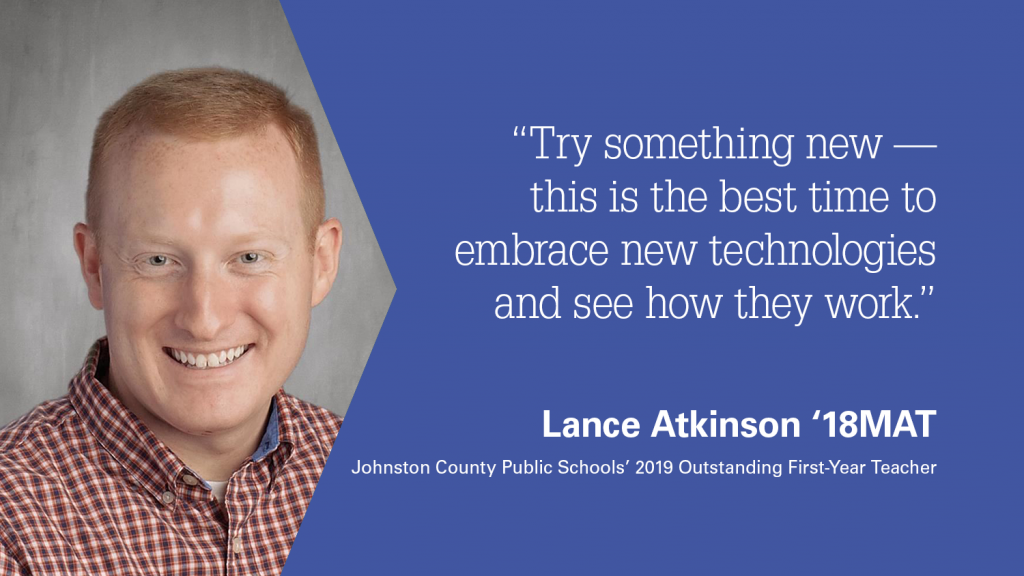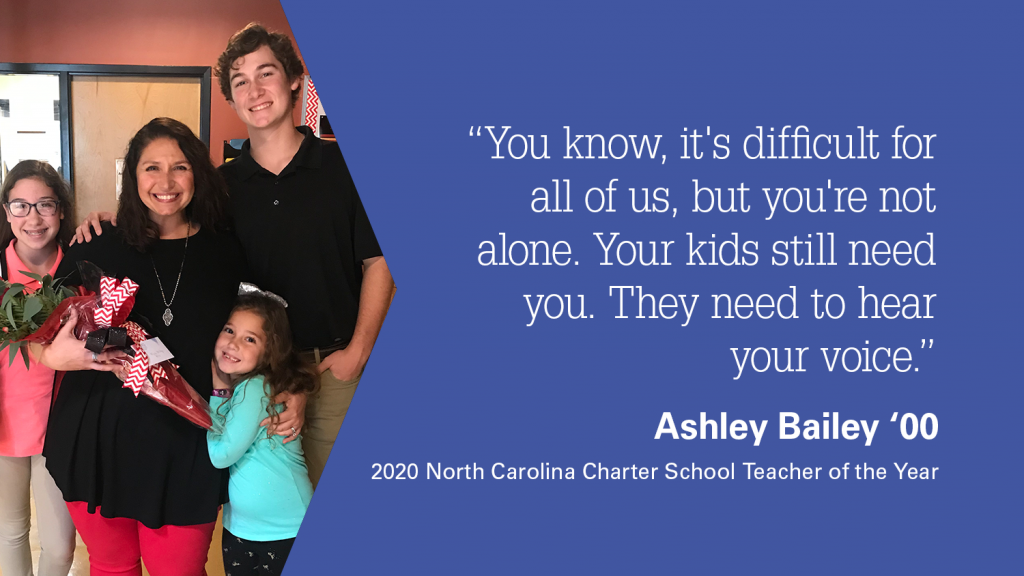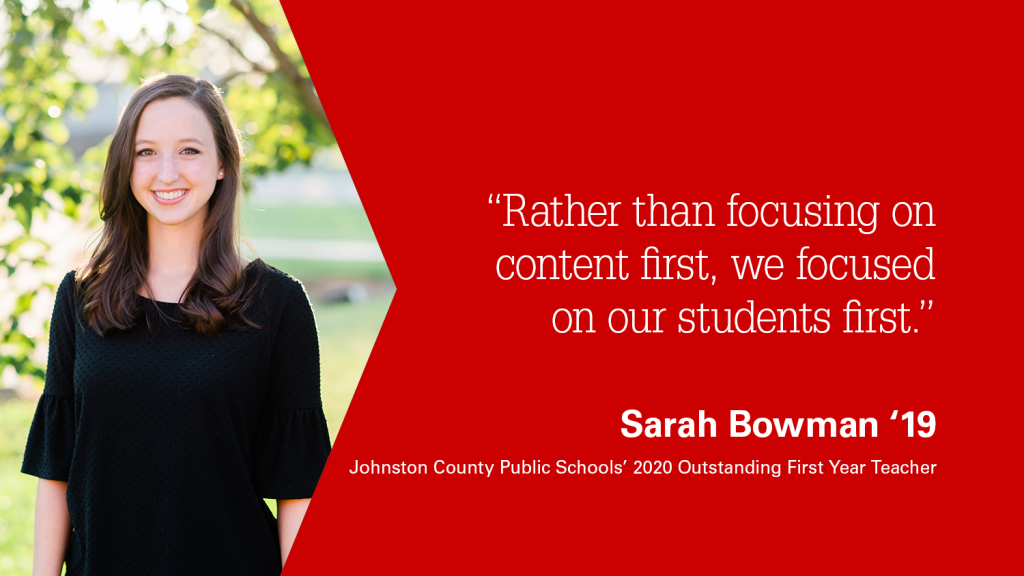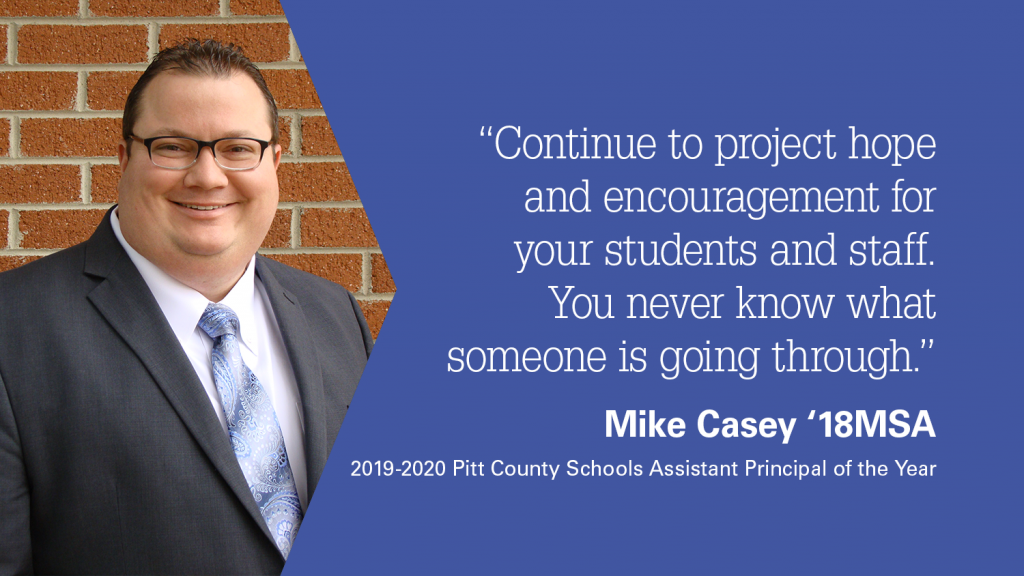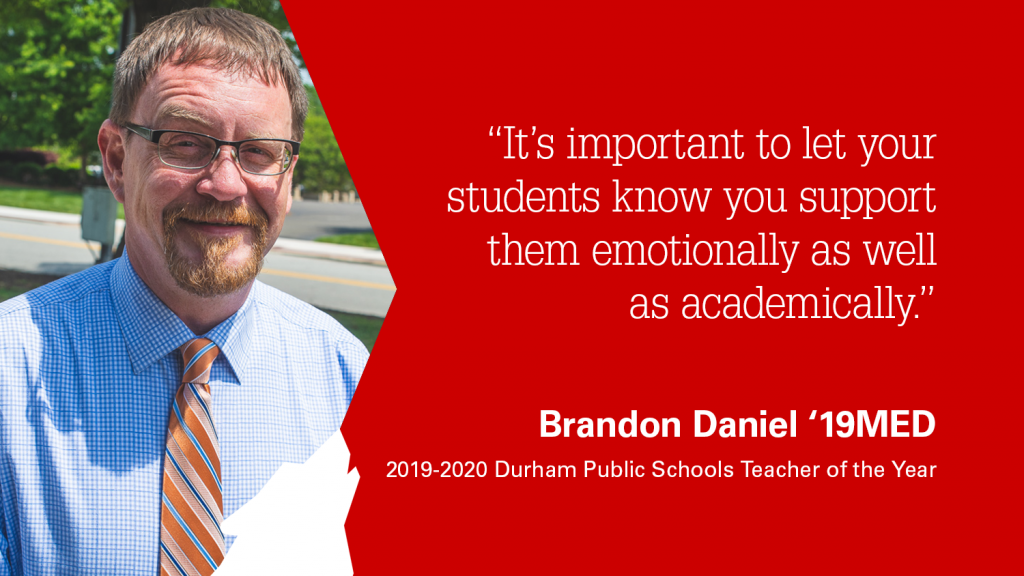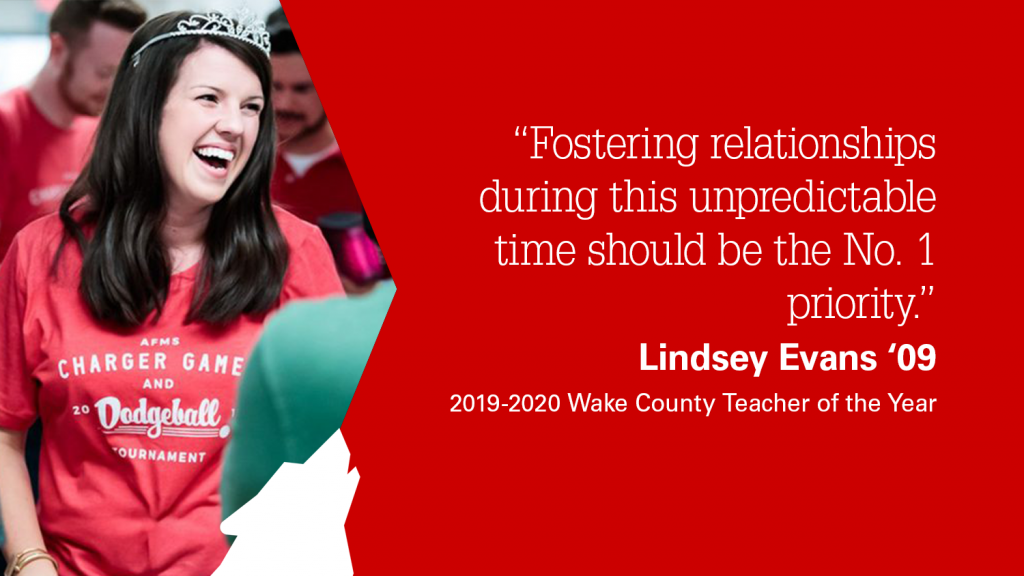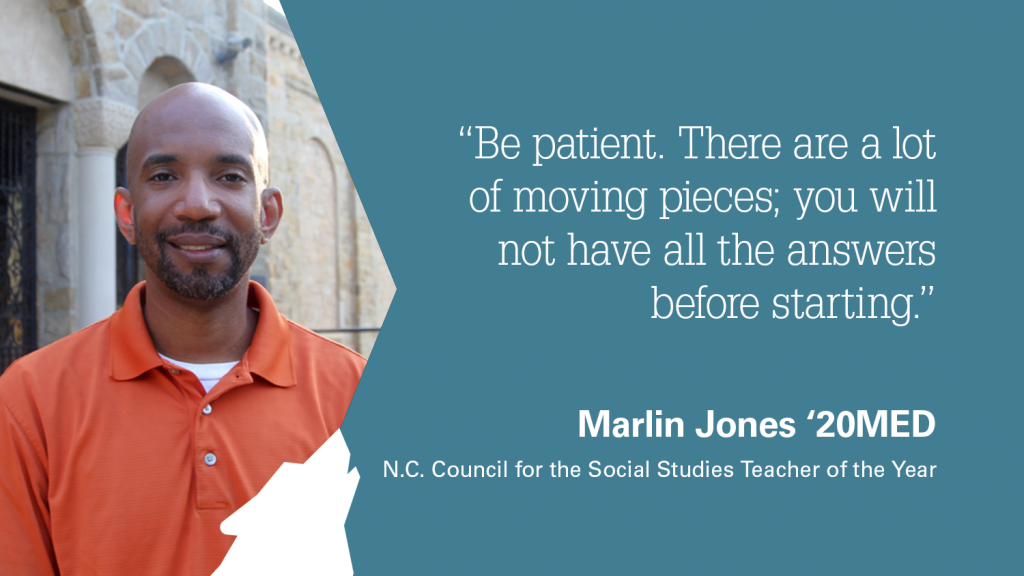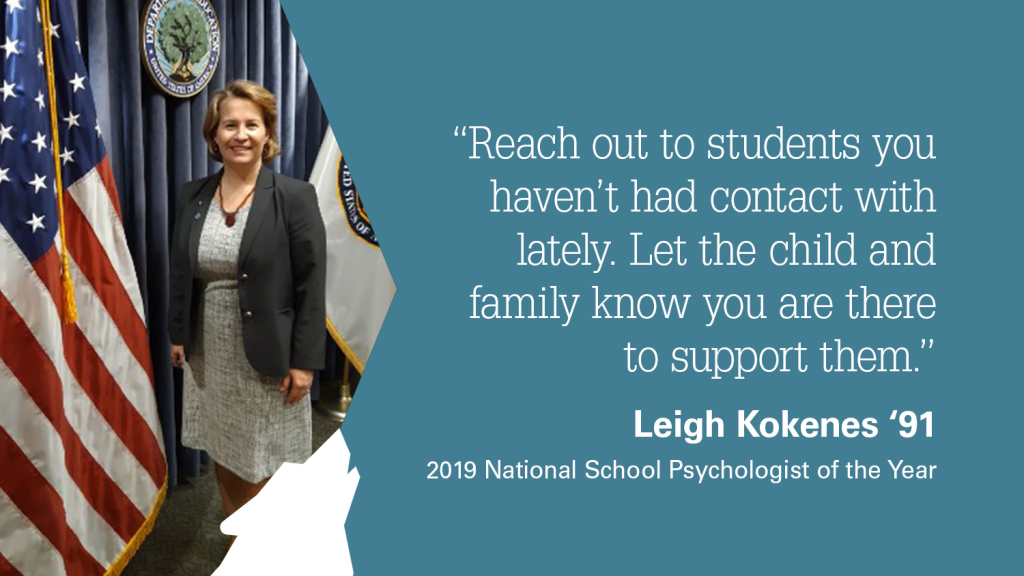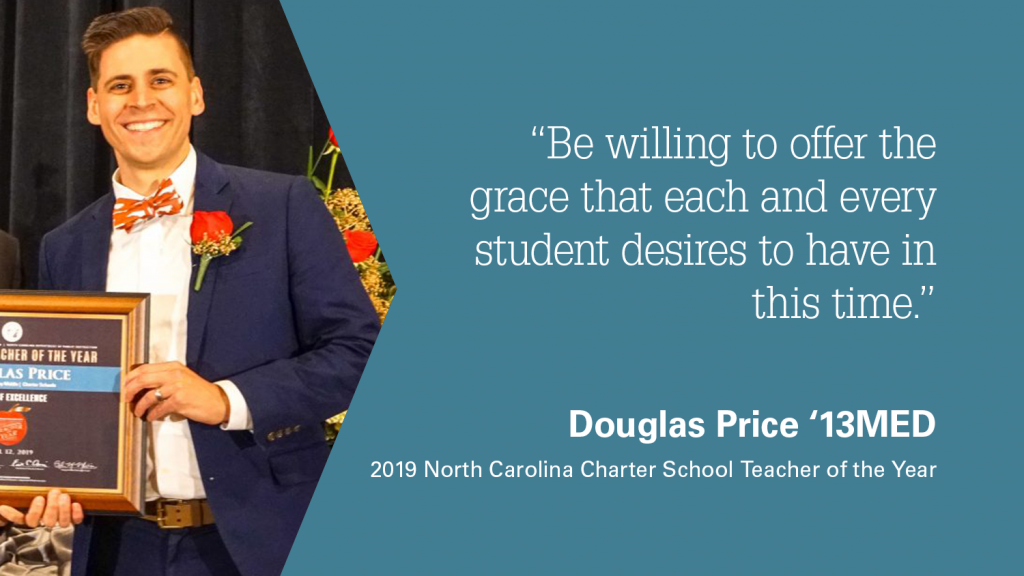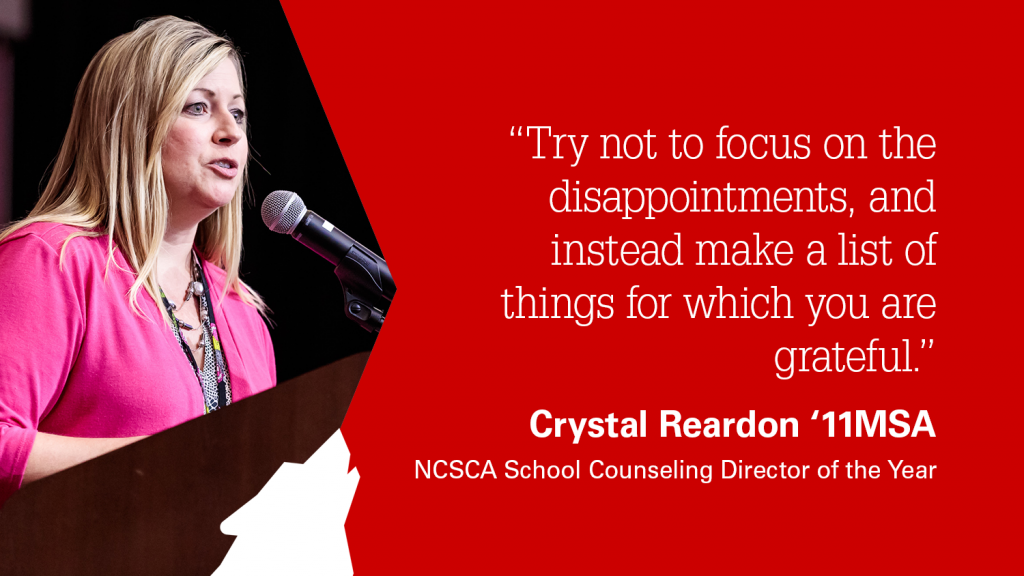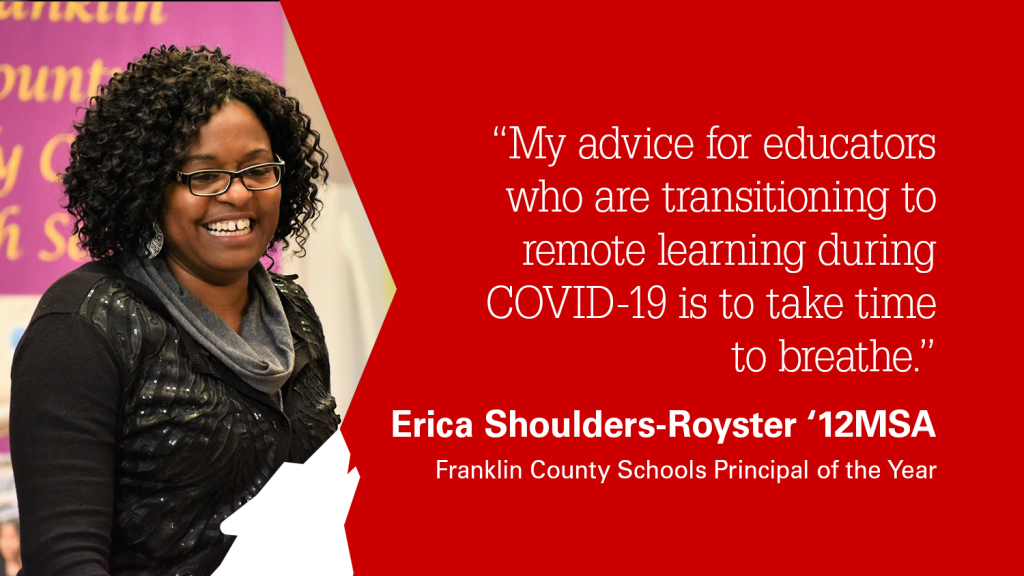NC State College of Education Award-Winning Alumni Share Tips for Virtual Teaching, Online Instruction
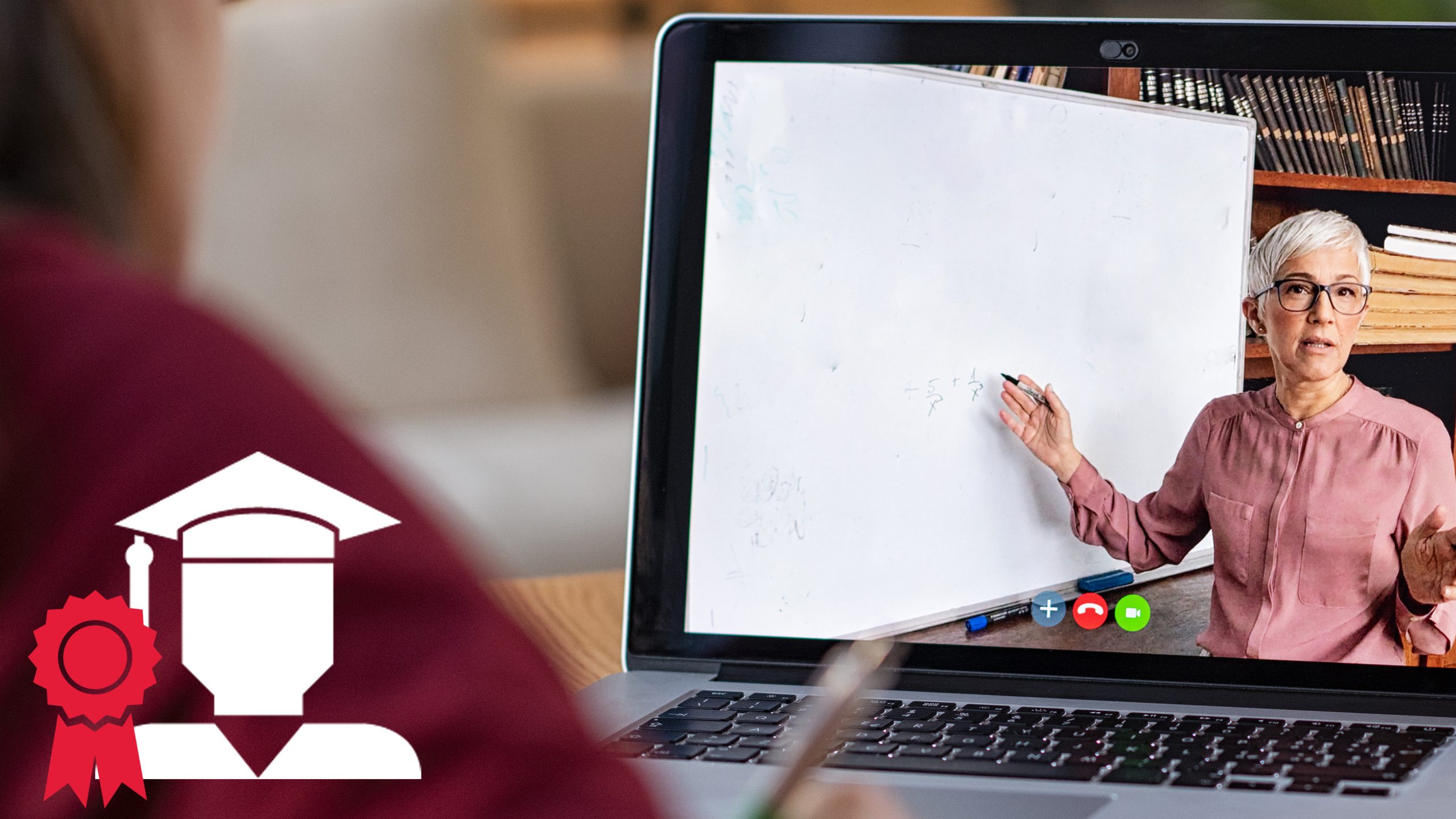
As the coronavirus (COVID 19) outbreak pushes education online, educators across the country are having to adapt to remote learning. It’s no different for NC State College of Education alumni, many of whom are developing new strategies and approaches to teaching and learning.
Here, some of the college’s alumni who work in K-12 schools and who have won national, state and district-wide awards share how they are adjusting and offer their advice for moving forward with remote learning.
Johnston County Public Schools’ 2019 Outstanding First-Year Teacher Lance Atkinson ‘18MAT
- First and most important, I would say to take a breath. Do not worry about reinventing the wheel. You know your curriculum and what needs to be done during the time online. Take your pacing guide and what you know you were going to do and simply ask yourself how this will work best online. You are still their teacher, and they need you more than ever.
- You cannot do this alone. Lean on your colleagues and help one another out. You could be an older teacher who is unsure about adapting your course to an online platform, or you could be a younger teacher who is comfortable with an online platform but is unsure what content or parts of the curriculum students should really be focusing on. Try something new — this is the best time to embrace new technologies and see how they work.
- Understand that because this is new for both your students and yourself, your students will be understanding, even if things start off a little rocky while you figure out the course online.
- Communicate with your students constantly and make sure they know you are there for them. Don’t just rely on email, make sure you are using applications such as Remind, Zoom or different social media mediums.
- When engaging with your students — for example, during a live online meeting — make them feel like it’s a normal classroom and allow them to express what may be going on in their lives during this time. Also, ask them if they have any questions about the coronavirus (COVID-19) outbreak and help them understand the overall impact of the situation. At the end of every email, message or conversation remind them you are here for them. “Don’t give up. Don’t ever give up.” — Jim Valvano.
- Teachers, don’t be afraid to simply Google something you don’t know or watch a YouTube tutorial. If you have a question on something, someone else has probably had the same, just like we tell the students. Everything from using Google Classroom, setting up Remind, creating a YouTube channel or best practices for online meetings.
- Take the time and seek out what professional development you actually want. Brush up on your content area or dive into all the endless online tools available to help students learn.
2020 North Carolina Charter School Teacher of the Year Ashley Bailey ‘00
Don’t be afraid to try new things. This is unprecedented for all of us and I’m so grateful that we have the tools to try some remote learning that maybe we haven’t had a chance to use in the classroom. The wonderful thing is that even in this really uncertain time, everyone in the education field has made things available for educators. free of charge. Programs that normally schools would have to pay for. They say, here, take this, use this. If it will help your kids do it. And we’re so grateful for that. And the network of educators has been incredible across the state.
North Carolina Virtual Public Schools is putting out all kinds of webinars. Say, if you’ve never used this tool before, hop on and we’ll teach you how. I was talking with teachers at my daughter’s elementary school, and I wrote an email to their principal because I said, these people are incredible. They have seven-year-olds on now using online platforms to do their work. And they learned it and got it out to the kids in two weeks. Educators are amazing with what they’re able to do in this time.
I just really encourage teachers to know that you’re not alone. I know when you’re like sitting in your kitchen, like I am right now, at your dining room table, which is your new office space and your own kids are trying to do their schoolwork, it’s hard. You know, it’s difficult for all of us, but you’re not alone. Your kids still need you. They need to hear your voice. They need to see your face. They need that connection. And so jump in, get out of your comfort zone. Take a video of yourself; send it to your kids. They will love it. Maybe you can’t hop on a Zoom call because all your kids don’t have access. But if you have a way, send them a message and tell them you’re still connecting with them. If you don’t know how to use something, reach out. Because the network of educators across the state, we’re really here for each other, and it’s been amazing.
Johnston County Public Schools’ 2020 Outstanding First Year Teacher Sarah Bowman ‘19
Figuring out how to create a beneficial learning environment in a remote setting in a matter of a few days was something that no first-year teacher could have expected, but was one that we all accomplished. In terms of adjustment, being at a school that already incorporated technology into our teaching often helped tremendously. However, there were still many aspects that were brand new. As a first-year teacher, I looked to other teachers at my school and even on platforms such as Instagram and Twitter as we navigated the situation and adapted together.
The biggest thing we focused on was the social-emotional wellbeing of our students. Rather than focusing on content first, we focused on our students first. As a team, we set up our first Google Meet and invited all of our seventh-grade students to join. At that time, we asked students how they were and what questions they had, while also ensuring they had time just to chat with one another. We focused on relationships from the very first week of school, our Pioneer Week. This is a week we take at the beginning of the school year where we do not focus on content, but we instead focus on relationships and social-emotional learning. That week helped me as a first-year teacher, and knowing my students was critical to the adjustment we made almost overnight to remote learning.
One other way the staff at my school transitioned to remote learning is through putting together modules for teachers in our district to utilize. That included a module for beginning teachers who are adapting to remote learning. It focused on what remote learning looks like with different teaching styles, and I was able to work alongside my mentor and our sixth-grade science teacher at the school.
Our school year has ended for this year, but if we are to continue teaching virtually, there are things I plan to continue in the fall. I will continue providing as much consistency as possible in the virtual setting in assignments and accountability. I believe this will help ensure students have greater success in accessing content. I also plan to provide as much time for social-emotional learning for students as I do for academic learning. Adolescents desperately need time to chat with one another and connect, even if it is virtual. I also plan to continue utilizing self-recorded teaching videos as well as live teaching to provide content accessibility for as many students as I can. One other strategy my team used to reach our students is through creating a grade-level Instagram to remind our students of different virtual events and opportunities. We will definitely continue to use all of these tools in the virtual setting.
2019-2020 Pitt County Schools Assistant Principal of the Year Mike Casey ‘18MSA
- People first — always.
- Walk slow to run fast.
- Continue to project hope and encouragement for your students and staff. You never know what someone is going through.
2019-2020 Durham Public Schools Teacher of the Year Brandon Daniel ’19MED
As a teacher, I want my students to have more control over their own education. Admittedly, I have struggled with sharing control of my classroom over the years. I’m grateful that I didn’t give up because now is the time where students are more in control of their learning than before.
I’m letting my students ask the questions and explore. I just try really hard to set the parameters. In math, I give an answer key and let students make the questions or test. For example, if the answer is 12 and a half, what’s the question?. I let students participate in the design, and we assess each other. I’m also asking open-ended questions or questions that have multiple solutions and ways to solve. I’m using images — sometimes sounds — and asking students to find the math and science in them. These scenarios invite student reasoning and generate more questions.
As a teacher, I’m also trying to engage them with content. Engagement has always been key to my teaching philosophy. If the subject matter itself isn’t engaging enough — most of the time it is, you just have to take multiple looks — our methods of analysis or final artifact or task can be. I’m facilitating learning by letting students get creative with projects and tasks, giving them a job to accomplish, instead of worksheets and review problems. I’m giving them options or choices of assignments to complete. I’m pointing out the cool concepts and ideas in the world around us and encouraging them to explore them and report back. Learning stuff is empowering. Teaching it to other students and your teacher can be too.
Most importantly, I check in on them and ask them how they’re doing and what they think about things. I value their opinions and encourage them to share. It’s important to let your students know you support them emotionally as well as academically.
2019-2020 Wake County Teacher of the Year Lindsey Evans ‘09
My advice for educators transitioning to remote learning is to prioritize connection over content. Everyone, including our students, is being heavily impacted by the COVID-19 situation. Fostering relationships during this unpredictable time should be the No. 1 priority. Our students need to know that we believe in them, we love them, and we are here for them.
To support connection over content, I would suggest having a variety of ways to connect with students. I have been keeping in touch with my students through Google Classroom posts, Remind messages, phone calls and Google Meet sessions. Not all students will participate in every option, but the goal should be to check in with each student in a way that meets the student’s needs. I also suggest making some of your questions for check-in light-hearted. We could all use a smile or laugh during these times and “just for fun” questions tend to bring those to everyone. Teaching is hard work, but these times have proven now more than ever that teaching is heart work.
N.C. Council for the Social Studies Teacher of the Year Marlin Jones ‘20MED
- Develop rules for virtual conduct.
- Contact as many of your students as possible to let them know the plan moving forward
- Meet with Professional Learning Team to share ideas and coordinate lessons
- Learn your platform — I am using Google Classroom.
- Be patient. There are a lot of moving pieces; you will not have all the answers before starting.
- Be prepared for problems. This is new to everyone. It is not going to be perfect on the day.
- My school is making sure all students have devices and internet access.
2019 National School Psychologist of The Year Leigh Kokenes ’91
Trust your instincts when you encounter a situation or a discussion that just doesn’t feel right. Reach out to students you haven’t had contact with lately. Let the child and family know you are there to support them. Ask if they want to talk, need help, and if they are ok.
Seek the resources that are currently and quickly available to you which include your administrators, your SISP team (also called student support services), and/or community resources. Professional educators serve students and families as a team but also as a compassionate community. There is a lot of support offered in schools at the local and state level and lots of caring people.
2019 North Carolina Charter School Teacher of the Year Douglas Price ‘13MED
Grace has never been more needed than right now. Grace for your students — you are in a position to be one of their greatest advocates, even in this time of great unknowns. Advocating may mean anticipating and knowing what their immediate needs are (think Maslowe’s hierarchy here), but it may also mean knowing and anticipating what their academic needs are (think Bloom’s taxonomy here).
Be willing to offer the grace that each and every student desires to have in this time. Help them know that they are recognized for their humanity, above all else. Likewise, provide grace for yourself; self-care is certainly essential, but self-care can be something as small as being flexible with your lesson plans, or being willing to put down the computer and picking up that book you’ve been longing to finish. Recognize the humanity within yourself, so that you may also present the best version of yourself to your students as we round out our time during this chaotic pandemic. Grace upon grace.
NCSCA School Counseling Director of the Year Crystal Reardon ‘11MSA
My advice during this time is less about the transition to online learning and more about the transition to the new and hopefully temporary “normal.”
Adults and students alike can feel overwhelmed by the lack of control they feel when the things they’re used to doing on a daily basis get taken away. It’s important to remember that the whole world is experiencing this event – not just one individual or one family. Safety and human life are the most important things to consider, and everything else will somehow fall into place. Try not to focus on the disappointments, and instead make a list of things for which you are grateful. Keep the list and add to it each day – it will be a good reminder now and in the future.
Franklin County Schools Principal of the Year Erica Shoulders-Royster ’12MSA
My advice for educators who are transitioning to remote learning during the coronavirus (COVID-19) outbreak is to take time to breathe. This is the first time that we can alter our schedule. It is very easy to be consumed and do more work than you would without this time. I am a firm believer in my faith, and I know things happen for a reason. I am trying to take time to reflect and engage in conversations that are meaningful.
- Categories:
